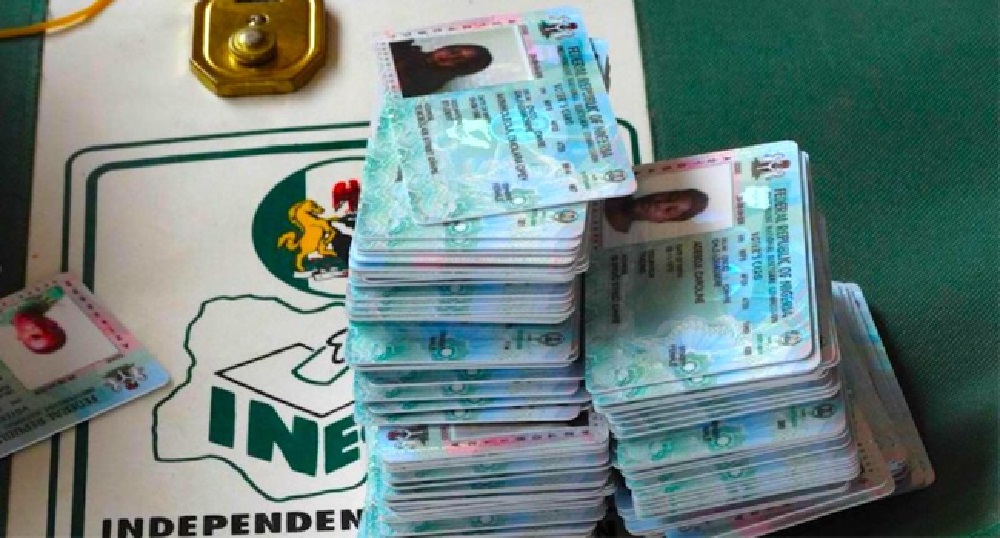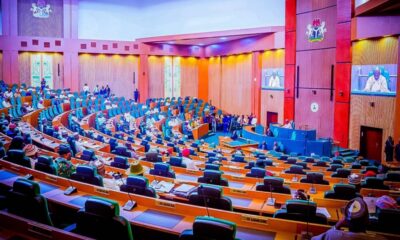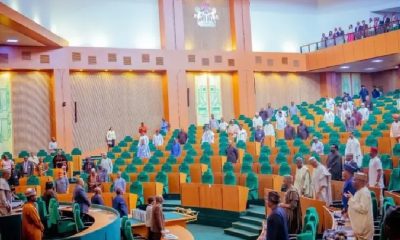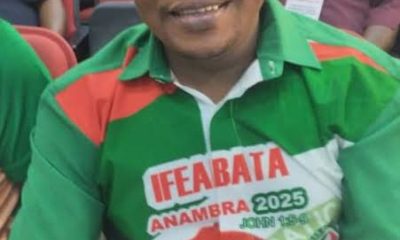News
INEC to destroy over six million uncollected PVCs

The Independent National Electoral Commission is contemplating a policy to withdraw and destroy Permanent Voter Cards that remain uncollected for a decade, The PUNCH has learnt.
This recommendation was among 208 proposals arising from the commission’s review of the 2023 general elections.
The move stemmed from the persistent issue of unclaimed PVCs, with over six million cards still uncollected as of the 2023 elections, including many issued as far back as 2015.
Stakeholders in the post-election review recommended that INEC address the backlog of uncollected PVCs by implementing a policy to withdraw PVCs that remain uncollected for extended periods, starting with cards issued in 2015.
The rationale is that these cards are unlikely to be claimed, and their retention clogs the voter management system.
“Following the publication of the Register of Voters, the commission made available the PVCs for collection by voters on December 12, 2022. The exercise was initially planned to end on the 22nd of January 2023. However, the fact that a huge number of registered voters had yet to collect their PVCs forced the commission to extend the deadline to the 5th of February 2023 after devolving the collection to the ward level between January 6-15, 2023 to ease the process.
“The low rate of PVC collection and other related challenges are illustrative of the problem of processing and managing voters in Nigeria. To increase the rate of collection of PVCs, the commission implemented a policy that made it possible for voters to locate their PVCs online and subsequently pick them up. Several CSOs supported the commission’s drive to increase PVC collection by working with INEC’s state/FCT Offices to record all uncollected PVCs and to inform their owners where and how to collect them.
“With support from the development partners, some of the CSOs also created information centres in selected states and the FCT to assist voters locate and collect their PVCs. Despite these efforts, over six million PVCs remained uncollected, many of them dating back to 2015.
Consequently, one recommendation from the review was that the commission should consider withdrawing PVCs issued in 2015 since it is not clear if the owners will ever collect them,” INEC said.
Also, the commission proposed plans to modernise Nigeria’s electoral process, including the gradual phase-out of PVCs and the introduction of diaspora voting.
It was explained that with the adoption of the Bimodal Voter Accreditation System, PVCs may no longer be necessary for voter accreditation. Instead, voters could use computer-generated slips or credentials downloaded from the commission’s website.
“Unlike the SCR, the voters’ register is now resident in the BVAS. The new device does not read and extract voters’ details from the PVC. Moreover, the Electoral Act 2022 has made biometric accreditation (fingerprint or facial) mandatory for voting.
“The utility of the PVC is now limited to voter identification. It is therefore possible to identify voters using their registration slips which obviates the need for PVCs, the cost of producing them, the logistics for their distribution and the fact that voters without them are unable to vote, thus raising serious issues of disenfranchisement.
With the BVAS, voters can be identified using their registration slips otherwise known as the Temporary Voter’s Card and accredited biometrically without the need for a plastic PVC.
“However, such a step requires the amendment of Section 47(1) of the Electoral Act 2022 which makes the presentation of the card (PVC) to the PO at the PU mandatory before accreditation and voting,” the recommendation said.
Political parties divided
Political parties in the country hold differing opinions about INEC’s plan to destroy uncollected PVCs.
In an interview with The PUNCH, the National Legal Adviser of the Labour Party, Kehinde Edun, believed that the initiative was in order, stressing that there was a need to declutter the voters register, especially if it is confirmed that many of those registered have died.
He said, “I am sure most of those uncollected PVCs must have been as a result of irregularities in the process of registration and all that. If truly people register to vote and register as eligible electorate, they must have collected over a long period, after being given enough time.
“But I believe no system is perfect. So I think destroying them may be in order. If people have not collected over a long period, there is a likelihood those lapses were the result of some irregularities in the process of registration.”
But the Peoples Democratic Party raised a concern that destroying uncollected PVCs could be another ploy by INEC to distract Nigerians.
The PDP Deputy National Youth Leader, Timothy Osadolor, who spoke to The PUNCH, said INEC had given Nigerians enough reasons to be suspicious.
He asserted that people refused to collect the PVCs because they had lost faith in INEC to make their votes count during elections.
Osadolor said, “How do you contemplate destroying cards produced with billions of taxpayers’ money because INEC has failed the credibility and integrity test that has made millions of Nigerians lose faith in the commission’s ability to organise free, fair and credible elections?
“I urge INEC to, as a matter of immediate action, begin an image laundering and rebranding campaign to convince Nigerians and stakeholders that the commission is ready to be truly independent in spelling, actions and character.”
Also, the New Nigeria People’s Party advised INEC to reconsider the plan to destroy PVCs.
The National Publicity Secretary of the NNPP, Ladipo Johnson, said destroying over six million voter cards would amount to sheer waste of money.
He said, “If people register and haven’t come to collect over a long period of time unless they know those people have passed on, I think the cards should not be destroyed as long as they are in safekeeping.
“If you destroy about six million PVCs, and all of a sudden, some of the owners show up and want to vote, it will cost God-knows-how-much to register them again. It’s a waste of money.”
SANs back INEC
However, some Senior Advocate of Nigeria, who spoke to The PUNCH backed INEC to destroy the uncollected PVCs, asserting that there are no legal impediments.
A former Chairman of the Presidential Advisory Committee Against Corruption, Prof. Itse Sagay (SAN), said some of the uncollected PVCs were likely products of double registration.
“They (uncollected PVCs) are taking space. My suspicion is that the owners don’t exist. It is double fraudulent registration by a lot of people. Just as I am sure that we are not up to 200 million neither do I believe that we are up to 90 million registered voters when only 20 percent of that is always voting. There is a lot of fake information and fake facts in this country and I’m sure this is part of it. So, let them destroy the uncollected PVCs,” he said.
Sharing a similar view, another SAN, Sam Erugo, said, “The PVCs have been uncollected over time, so I don’t see anything wrong in them destroying them because not collecting them means something is definitely wrong with the owners. Either they are dead or they are duplication. Now, that brings the question whether eligible voters have voters card or that will will impede their right to vote or not.
That is a different question altogether but if they have uncollected voter cards, of course, they have a right to destroy them because that will help stop people from using them to rig elections. Given that they are uncollected, they are useless already and money has been wasted already.”
But Paul Obi (SAN) differed, calling for greater awareness instea of rushing to destroy the PVCs.
“What is the basis for destroying six million voters cards?” he queries. “Even if they are uncollected, they belong to Nigerians who are also supposed to use them in the next election and they spent money in producing them.
“I think greater awareness should be created for people who own those PVCs to collect them. It doesn’t make sense spending money and next time they will still have to produce PVCs for those people who own them. More awareness should be done for collection,” he said.
Credit: PUNCH
News
Just in: Security and Exchange Commission declares PWAN as PONZI scheme, cautions Nigerians

Securities and Exchange Commission (SEC) has alerted the public on the activities of Property World Africa Network (PWAN), which holds itself out as a real estate investment company and solicits funds from the public for investment purposes through PWAN MAX.
In a statement on Tuesday, the SEC said PWAN/PWAN MAX are not registered either to solicit investments from the public or operate in any other capacity within the Nigerian capital market.
The SEC said investigations revealed that PWAN’s operations exhibit the typical indicators of a fraudulent Ponzi scheme, including the promise of unusually high returns and failure to honour withdrawal requests from subscribers.
“Accordingly, the public is strongly advised to be wary about investing with PWAN/PWAN MAX, as any person who places such investment with these entities, does so at his/her own risk.
“The commission similarly reminds potential investors of the need to verify the registration status of investment platforms via the commission’s dedicated portal: www.sec.gov.ng/cmos before transacting with them,” the SEC said.
(The Guardian)
News
Canada is not for sale, Carney tells Trump

Canadian Prime Minister Mark Carney told US President Donald Trump that his country was “never for sale” Tuesday as they met at the White House amid tensions on tariffs and sovereignty.
In their first Oval Office meeting, Trump insisted to the recently elected Carney that it would be a “wonderful marriage” if Canada agreed to his repeated calls to become the 51st US state.
But despite Trump’s claims of friendly relations, the body language became increasingly tense between the 78-year-old Republican and the 60-year-old Canadian leader.
“As you know from real estate, there are some places that are never for sale,” Carney told property tycoon Trump, comparing Canada to the Oval Office itself and to Britain’s Buckingham Palace.
“Having met with the owners of Canada over the course of the campaign in the last several months, it’s not for sale. It won’t be for sale, ever.”
Trump then replied: “Never say never.”
Carney won the Canadian election of April 28 on a pledge to stand up to Trump, warning that ties between the North American neighbors could never be the same.
Trump has sparked a major trade war with Canada with his tariffs while repeatedly making extraordinary calls for the key NATO ally and major trading partner to become part of the United States.
Despite that, the two leaders began their meeting with warm words towards each other.
Twice-elected Trump hailed Carney, whose Liberal Party surged from behind to win the election, for “one of the greatest comebacks in the history of politics, maybe even greater than mine.”
But while they expressed a willingness to work towards a trade deal to end the tariffs, it became clear that common ground would be hard to find.
‘Little blow-up’
Carney at points gripped his hands tightly together and his knee jiggled up and down while Trump spoke.
No. It’s just the way it is,” Trump said when asked if there was anything Carney could say in the meeting that would persuade him to drop car tariffs in particular.
And when the US president pressed his claim that Canadians might one day want to join the United States, Carney raised his hand and pushed back.
Respectfully, Canadians’ view on this is not going to change on the 51st state,” said Carney.
A visibly tense Trump then referenced his blazing Oval Office row with Ukrainian President Volodymyr Zelensky in February — if only to insist that there would be no repeat.
“We had another little blow-up with somebody else, that was much different — this is a very friendly conversation,” Trump said.
Carney gave a thumbs up to reporters as he left the White House after just over two hours. He is due to give a press conference at 3pm (1900 GMT).
The meeting was highly anticipated after a Canadian election during which Carney vowed that the United States would never “own us.”
Carney has since vowed to remake NATO member Canada’s ties with the United States in perhaps its biggest political and economic shift since World War II.
Trump has slapped general tariffs of 25 percent on Canada and Mexico and sector-specific levies on autos, some of which have been suspended pending negotiations. He has imposed similar duties on steel and aluminum.
‘Important moment’
The US president inserted himself into Canada’s election early on by calling on Canada to avoid tariffs by becoming the “cherished 51st state.”
Pierre Poilievre’s Conservative Party had been on track to win the vote but Trump’s attacks, combined with the departure of unpopular premier Justin Trudeau, transformed the race.
Carney, who replaced Trudeau as prime minister in March, convinced voters that his experience managing economic crises made him the ideal candidate to defy Trump.
The political newcomer previously served as governor of the Bank of Canada and the Bank of England, and in the latter post he played a key role reassuring markets after the 2016 Brexit vote.
Carney is known for weighing his words carefully but still faced a challenge dealing with the confrontational Trump on the US president’s home turf.
“This is a very important moment for him, since he insisted during the campaign that he could take on Mr Trump,” Genevieve Tellier, a political scientist at the University of Ottawa, told AFP.
One point in Carney’s favor is that he is not Trudeau, the slick former prime minister whom Trump famously loathed and belittled as “governor” of Canada, she added.
News
SAD! Army Captain, Soldier Killed In Recent Borno Attack

An army Captain and a soldier have been killed by Boko Haram terrorists in a midnight attack on Izge community in Gwoza Local Government Area of Borno State
According to the Emir of Gwoza, Mohammed Shehu Timta, the attack happened around 1 am on Wednesday when the terrorists infiltrated the farming community, shooting sporadically before the personnel of the Nigerian Armed Forces with the assistance of local hunters, vigilantes and members of the civilian Joint Task Force repelled the terrorists, killing three of them while recovering items from the fleeing terrorists
Several motorcycles, bicycles, an operational vehicle and a sophisticated rifle, all belonging to the terrorists were recovered.
Speaking to Channels Television Wednesday morning, the traditional ruler commended the military, men of the Civilian Joint Task Force, Local hunters, vigilantes and the resilient community of Izge for their collaborative efforts in repelling the attack while praying for the repose of the souls of the departed military personnel and their family during this irreparable loss.
He also called on urgent step by the Federal Government to address the renewed attacks, as people prepare for this year’s farming season.
“My people in Izge community came under Boko Haram invasion today at about 1am. Unfortunately, a Captain and a Soldier paid the supreme price. But in a brave and swift reaction from the military, men of the Civilian Joint Task Force, Local hunters, vigilantes and the resilient community the attack was repelled with killing of three terrorists.
“As the community is still trailing the terrorists, over 10 bicycles, motorcycles, one sized military vehicle and one sophisticated rifle with ammunition were recovered from the terrorists.
“Let me commend our military forces, other security agencies, men of CJTF, local hunters and vigilantes and our resilient people for their bravery, because as I speak, many people are still in the bush combing the whereabouts of the fleeing terrorists.
“Let me equally commend our passionate governor, Professor Babagana Zulum for his relentless efforts in providing enabling resources to the security agencies and our CJTF members in the fight against Boko Haram/ISWAP terrorists which has brought about relative peace and resettlement of many displaced people back to their ancestral homes.
“I want to equally call on the federal government to equip our security forces with technological warfare/weapons to defeat the remnants of Boko Haram members terrorising our communities almost on daily basis”.
-

 Opinion24 hours ago
Opinion24 hours agoRIVERS, WIKE, FUBARA, AND THE WAY FORWARD
-

 Politics22 hours ago
Politics22 hours agoJust in: Delta PDP Reps members defect to APC
-

 News3 hours ago
News3 hours agoReal cause of Herbert Wigwe’s helicopter crash revealed
-

 News21 hours ago
News21 hours agoTension As Lawmakers Warn of Public Revolt Over Insecurity
-

 News20 hours ago
News20 hours agoEdo Speaker, Two Other Lawmakers, Formally Join APC
-

 News9 hours ago
News9 hours ago2027: Why Obi should reject VP slot — Tinubu’s aide
-

 News21 hours ago
News21 hours agoRep Raises Alarm After Deadly Attacks In Borno, Says Boko Haram Is Returning Stronger
-

 News9 hours ago
News9 hours agoTinubu presents N1.78 trillion FCT budget to NASS

















